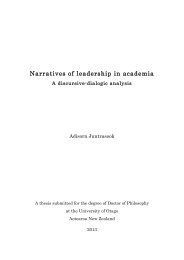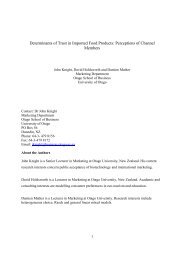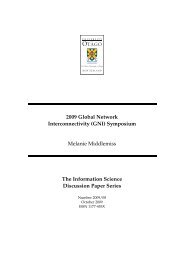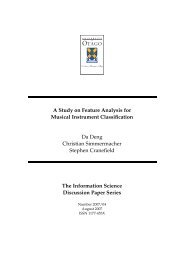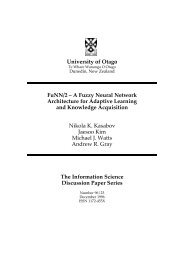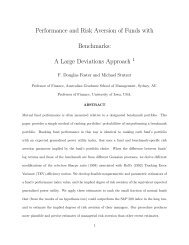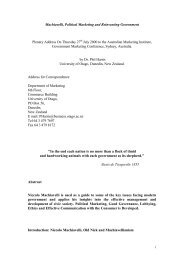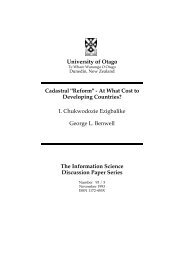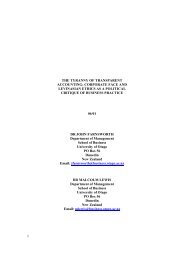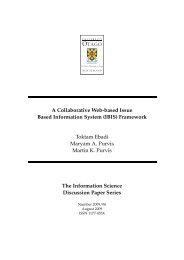Where is R2P grounded in international law? Anne-Marie Judson A ...
Where is R2P grounded in international law? Anne-Marie Judson A ...
Where is R2P grounded in international law? Anne-Marie Judson A ...
Create successful ePaper yourself
Turn your PDF publications into a flip-book with our unique Google optimized e-Paper software.
diplomatic and consular staff. 97 These acts or om<strong>is</strong>sions constitute responsibility; they<br />
are not primary <strong>law</strong>s but secondary <strong>in</strong> that the acts or the om<strong>is</strong>sions are secondary to<br />
the primary rules. The primary rules outl<strong>in</strong>e the duties or obligations and yet it <strong>is</strong> the<br />
actions or om<strong>is</strong>sions that constitute the breach.<br />
The state itself <strong>is</strong> not a person and yet these actions or om<strong>is</strong>sions are attributable to<br />
the state. The actors of the state are members of the society that have perm<strong>is</strong>sion to<br />
act on behalf of the state. The “act of the state must <strong>in</strong>volve some action or om<strong>is</strong>sion<br />
by a human be<strong>in</strong>g or group … states can act only by and through their agents and<br />
representatives.” 98 The question then ar<strong>is</strong>es as to what conduct (actions or om<strong>is</strong>sions)<br />
can be attributed to the state? Several cases can provide clarification of th<strong>is</strong> question.<br />
In 1930 a Hague conference adopted the term “any failure … to carry out<br />
<strong>in</strong>ternational obligations of the state”. 99 In the Ra<strong>in</strong>bow Warrior case a breach was “any<br />
violation by a state of any obligation.” The commentary by the ILC refers to terms<br />
<strong>in</strong>clud<strong>in</strong>g “non-execution of <strong>in</strong>ternational obligations, violation of an <strong>in</strong>ternational<br />
obligation or breach of engagement”, it also refers to the codification of <strong>in</strong>ternational<br />
<strong>law</strong>. The elements therefore are wide and th<strong>is</strong> <strong>is</strong> further reflected <strong>in</strong> Article 3.<br />
CAN A STATE USE INTERNAL OR MUNICIPAL LAW AS A DEFENCE FOR<br />
VIOLATIONS OF INTERNATIONAL LAW?<br />
Article 3 and the commentaries by the ILC focus on the denial of <strong>in</strong>ternal <strong>law</strong> as a<br />
defence aga<strong>in</strong>st an act or om<strong>is</strong>sion of an <strong>in</strong>ternationally wrongful act. A state cannot<br />
plead that the breach does not apply because the actions were <strong>in</strong> conformity with<br />
<strong>in</strong>ternal or municipal <strong>law</strong>. Apart from Article 27 of the Vienna Convention (1969)<br />
which states that “A party may not <strong>in</strong>voke the prov<strong>is</strong>ions of its <strong>in</strong>ternal <strong>law</strong> as<br />
justifications for its failure to perform a treaty”, there are many other relevant cases<br />
and op<strong>in</strong>ions of th<strong>is</strong> defence <strong>in</strong> <strong>in</strong>ternational <strong>law</strong>. The ILC commentary says “ a state<br />
cannot by plead<strong>in</strong>g that its conduct conforms to the prov<strong>is</strong>ions of its <strong>in</strong>ternal <strong>law</strong><br />
escape the characterization of that conduct as wrongful by <strong>in</strong>ternational <strong>law</strong>”. Nor<br />
97 United States Diplomatic and Consular staff <strong>in</strong> Tehran case, (United States v. Iran) (1980) ICJ <br />
reports pp 31-‐32, see also Velasquez Rodriguez v. Honduras case, (1988) Inter-‐American Court of <br />
Human Rights, series c, no 4, para 170 <br />
98 See German settlers <strong>in</strong> Poland, Adv<strong>is</strong>ory op<strong>in</strong>ion, (1923), PCIJ series b, no 6, page 22: also cited <br />
<strong>in</strong> commentaries page 35 <br />
99 See Conference for the codification of International Law, the Hague (1930) Yearbook (1956) <br />
volume ii, page 225, A/CN.4/96 <strong>Anne</strong>x 3, article 1 <br />
<br />
39



